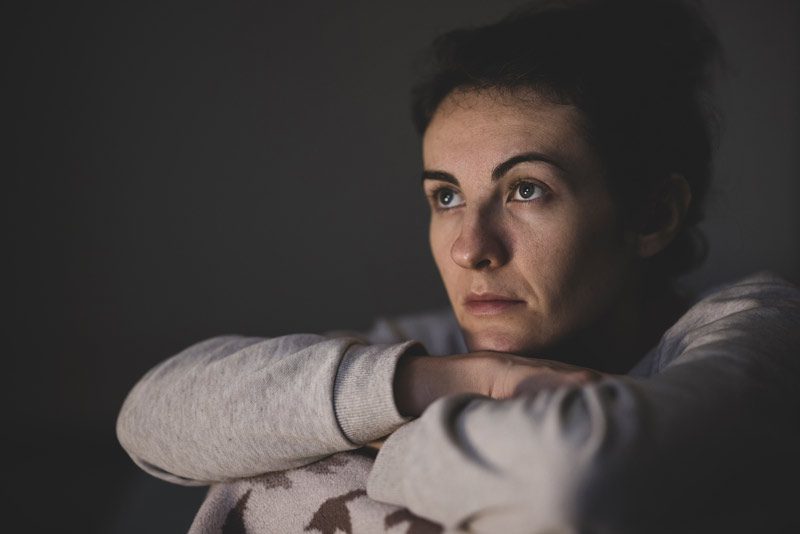Since early 2020, the COVID-19 pandemic has created challenges in many people’s lives. But for people with a substance use disorder, the stress of the pandemic may pose unique risks.
It’s not uncommon for people to use drugs or alcohol to cope with difficult situations or feelings. Even those without a history of substance abuse may have turned to substances to cope with the stress of a global pandemic. Additionally, people with pre-existing substance use disorders can be at risk for relapse.
According to the Centers for Disease Control and Prevention, as of June 2020, 13% of Americans reported starting or increasing substance use as a way of coping with stress or emotions related to COVID-19. Overdoses have also spiked since the onset of the pandemic.
Though we may be on our way out of the pandemic, we need to think about the many side effects it has had on our overall health, not just physical health. In a study from 2020, 20% of respondents reported that they or a loved one had increased their substance use. Last year there was an 18% increase in drug overdoses.
These trends can have lasting impacts even after the worst of the pandemic is over. As with mental health, it’s important to pay attention to substance use in yourself and your loved ones.
Why is the Pandemic Tough on Those with Substance Use Disorders?
We know that the COVID-19 pandemic has impacted our mental health in the U.S. In June 2020, 40% of U.S. adults reported struggling with their mental health or substance abuse. Symptoms of an anxiety disorder were three times more prevalent and symptoms of depression were four times more prevalent during this period than they had been at the end of 2019. Mental illness alone, which typically affects one in five U.S. adults, is now affecting nearly two in five U.S. adults.
Mental illness symptoms, which for many people have been exacerbated during the pandemic, can lead them to abuse drugs. It doesn’t help that coping mechanisms, like meeting with friends or a support system, getting outside, or simply getting out of the house, may not be possible during the pandemic. Increased mental distress may cause more people to develop or fall back into substance abuse.
Even those who want to get help for their substance use disorder may not get it during the pandemic. Studies show there has been a decrease in the use of substance abuse recovery programs because of the pandemic. Researchers suggest that people may be more likely to go without substance abuse treatment to avoid exposure to COVID-19. Some individuals have had to wait longer to get a spot because treatment programs have more limited capacity.
Stress and negative emotions can cause people to look for ways to cope. Studies show that worrying about the pandemic has caused people to turn to substance use for relief. Financial woes, isolation, and grief related to the pandemic can all be causes of increased stress.
How Can We Help?
Substance use disorder treatment is effective and can change people’s lives. Treatment can look like joining a support group, staying at a residential treatment center, taking medication, attending behavior therapy, or a combination of these approaches.
Treatment works, but it’s not always easy to access. It’s estimated that only 19% of individuals who need substance use treatment receive it. Some forms of treatment can be unaffordable, and stigma can prevent people from getting help. Also, substance abuse is often criminalized rather than being appropriately treated with the right supports.
In order to solve the substance abuse problem, especially with increased prevalence during the pandemic, we need to make treatment easier to access and less stigmatized. We need more programs that are affordable and in more communities. Substance abuse treatment programs are an investment for better community health.
Everyone who needs treatment deserves to get it, regardless of cost. However, treatment programs and medications can be expensive. If we want to have less drug use in our communities, getting treatment for recovery needs to be affordable.
We also need to work to reduce stigma towards substance abuse recovery. Too often, people who use drugs are looked down on, or thought of as dangerous criminals. In reality, addiction is not a person’s fault. Many biological factors, such as genetics, can contribute to developing a substance use disorder. Even those who choose to abuse drugs don’t go into it intending to become addicted.
We need to view substance abuse as a person-oriented problem to be solved rather than something to be handled by the criminal justice system. Jailing people with substance use disorders instead of getting them treatment worsens the problem rather than solving it.
We need to prioritize treatment, especially as we reach the end of the pandemic, and work to restore the well-being of our communities. We need to support one another in our journeys to recovery.
How Do I Get Help?
Getting professional treatment is the best way to decrease drug abuse and recover. Need help? Reach out to your health care provider or Contact a Resource Specialist through rtor.org. You can also call the U.S. Substance Abuse and Mental Health Services Administration’s helpline at 1-800-662-HELP (4357).
About the Author: Mary Beth Fessler is the Director of Coordinated Health and Residential Services at Guild, bringing over 12 years of experience in the field. Her areas of interest are residential treatment, substance use disorders, Relational Cultural Theory, secondary trauma, gender-specific services, supervision, education, and leadership. Mary Beth has her Master’s Degree in Addiction Counseling from the Hazelden Betty Ford Graduate School of Addiction Studies, has studied leadership at St. Mary’s University, and is a Licensed Alcohol and Drug Counselor and a Licensed Professional Clinical Counselor. If you need mental health help, call Guild at (651) 925-8490. We can help. Recovery is always possible.
Sources:
- Issue Brief: Reports of Increases in Opioid and Other Drug-Related Overdose and Other Concerns During COVID Pandemic, American Medical Association.
- 81,230 Overdoses Set Record for Such Deaths in a 12-Month Period, CDC Says, Washington Post.
- Overdose Deaths Appear to Rise Amid Coronavirus Pandemic in U.S., NBC News.
- Drug Addiction (Substance Use Disorder), Mayo Clinic.
- Addressing the Unique Challenges of COVID-19 for People in Recovery, National Institute on Drug Abuse.
- Overdoses are Increasing in the U.S. Over COVID-19: Here’s What Addiction Experts Want You to Know, Forbes.
- Alcohol and Drug Addiction Statistics, American Addiction Centers.
- Pandemic Pushes Mental Health to the Breaking Point, The Harvard Gazette.
- Mental Health, Substance Abuse, and Suicidal Ideation During the COVID-19 Pandemic, CDC.
Photo by engin akyurt on Unsplash
The opinions and views expressed in any guest blog post do not necessarily reflect those of www.rtor.org or its sponsor, Laurel House, Inc. The author and www.rtor.org have no affiliations with any products or services mentioned in the article or linked to therein. Guest Authors may have affiliations to products mentioned or linked to in their author bios.
Recommended for You
- The Intersection of LGBTQ+ Identity and Mental Health - December 9, 2024
- What Are the Signs of Self-Harm? A Comprehensive Guide - December 5, 2024
- People-Pleasing: Definition, Examples, and What You Can Do Instead - December 2, 2024





